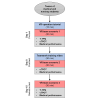Training and Assessing Teamwork in Interprofessional Virtual Reality-Based Simulation Using the TeamSTEPPS Framework: Protocol for Randomized Pre-Post Intervention Study
- PMID: 40424618
- PMCID: PMC12152433
- DOI: 10.2196/68705
Training and Assessing Teamwork in Interprofessional Virtual Reality-Based Simulation Using the TeamSTEPPS Framework: Protocol for Randomized Pre-Post Intervention Study
Abstract
Background: Interprofessional teamwork is essential for patient outcomes in emergency medicine; yet, effective training in this area is scarce. Virtual reality (VR) provides a promising, resource-efficient solution for simulating emergency scenarios and facilitating interprofessional collaboration. While VR-based training has shown benefits for medical skill and knowledge acquisition, assessing teamwork within such environments remains a challenge due to the lack of validated measurement tools. Existing teamwork assessment instruments, developed for physical simulations, may not fully apply to VR due to differences in communication modalities, interaction mechanics, and observer perspectives.
Objective: This study aims to adapt and validate the TeamSTEPPS framework to assess teamwork in VR-based training. Subsequently, these adapted instruments will enable the investigation of whether interprofessional teamwork can be successfully trained in VR scenarios.
Methods: Prior to the study, measurement instruments for subjective (Teamwork Perceptions Questionnaire) and objective teamwork quality (Team Performance Observation Tool, TPOT) will be adapted and validated for use in VR scenarios. Validation of the adapted version of the Team Performance Observation Tool includes expert consensus via a modified Delphi method as well as validity and reliability testing using recorded VR teamwork sessions. The study itself is designed as a prospective pre-post study with a planned enrollment of 65 nursing and 65 medical students working in randomly assigned interprofessional teams. On 3 timepoints (day 1, day 8, and day 15), participants engage in a VR scenario simulating 1 out of 3 different emergency medical conditions (esophageal variceal bleeding, exacerbated chronic obstructive pulmonary disease, and atrial fibrillation due to urinary tract infection). As an intervention, a structured training video on successful teamwork according to the TeamSTEPPS concept is shown on day 8 immediately before the second VR scenario. Teamwork is assessed objectively with the adapted version of the Team Performance Observation Tool and subjectively with the adapted Teamwork Perceptions Questionnaire. Medical performance will be recorded automatically by the VR software based on the medical measures conducted by the team.
Results: As of May 2024, a total of 28 interprofessional teams have been enrolled. Data analysis will begin in late 2025.
Conclusions: This study addresses the challenge of adapting teamwork assessment tools to VR environments and may provide insights into the potential of VR-based training for improving interprofessional collaboration in medical education. Future research could include a control group to measure the effects of team training more rigorously or use more enhanced technologies (eg, natural language processing) to capture the full range of teamwork behavior.
International registered report identifier (irrid): DERR1-10.2196/68705.
Keywords: Team Performance Observation Tool; TeamSTEPPS; Teamwork Perceptions Questionnaire; interprofessional teamwork; medical education; team training; virtual reality.
©Marie Lehmann, Jan Mikulasch, Horst Poimann, Joy Backhaus, Sarah König, Tobias Mühling. Originally published in JMIR Research Protocols (https://www.researchprotocols.org), 27.05.2025.
Conflict of interest statement
Conflicts of Interest: TM was involved in the software development process of STEP-VR.
Figures


Similar articles
-
Advancing Politeness and Assertive Communication Through Tone of Voice in Crisis Team Situations: Pre-Post Acoustic Analysis Study of Team and Strategies to Enhance Performance and Patient Safety (TeamSTEPPS) Virtual Simulation for Interprofessional Education in Health Care Undergraduate Students.J Med Internet Res. 2025 Apr 21;27:e66988. doi: 10.2196/66988. J Med Internet Res. 2025. PMID: 40258598 Free PMC article.
-
Effect of Immersive Virtual Reality Teamwork Training on Safety Behaviors During Surgical Cases: Nonrandomized Intervention Versus Controlled Pilot Study.JMIR Med Educ. 2025 May 1;11:e66186. doi: 10.2196/66186. JMIR Med Educ. 2025. PMID: 40311122 Free PMC article.
-
Cross-cultural validation and psychometric testing of the French version of the TeamSTEPPS teamwork perceptions questionnaire.J Health Organ Manag. 2024 Aug 29;38(6):923-941. doi: 10.1108/JHOM-01-2023-0004. J Health Organ Manag. 2024. PMID: 39198954
-
Virtual reality simulation training for health professions trainees in gastrointestinal endoscopy.Cochrane Database Syst Rev. 2018 Aug 17;8(8):CD008237. doi: 10.1002/14651858.CD008237.pub3. Cochrane Database Syst Rev. 2018. PMID: 30117156 Free PMC article.
-
Evaluation of teamwork assessment tools for interprofessional simulation: a systematic literature review.J Interprof Care. 2020 Mar-Apr;34(2):162-172. doi: 10.1080/13561820.2019.1650730. Epub 2019 Sep 25. J Interprof Care. 2020. PMID: 31552752
References
-
- Rosen MA, DiazGranados D, Dietz AS, Benishek LE, Thompson D, Pronovost PJ, Weaver SJ. Teamwork in healthcare: key discoveries enabling safer, high-quality care. Am Psychol. 2018;73(4):433–450. doi: 10.1037/amp0000298. https://europepmc.org/abstract/MED/29792459 2018-23205-011 - DOI - PMC - PubMed
-
- Gross B, Rusin L, Kiesewetter J, Zottmann JM, Fischer MR, Prückner S, Zech A. Crew resource management training in healthcare: a systematic review of intervention design, training conditions and evaluation. BMJ Open. 2019;9(2):e025247. doi: 10.1136/bmjopen-2018-025247. https://bmjopen.bmj.com/lookup/pmidlookup?view=long&pmid=30826798 bmjopen-2018-025247 - DOI - PMC - PubMed
MeSH terms
LinkOut - more resources
Full Text Sources
Research Materials

